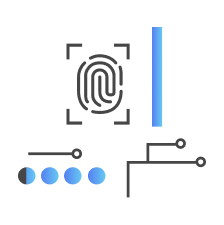In today’s increasingly digital world, the software development process is under more pressure than ever to deliver secure, user-friendly, and high-performing products. With user expectations climbing and competition heating up, software quality is no longer optional — it’s the foundation of every successful release. Ensuring it takes more than just internal diligence; it takes strategy.
That’s why many companies are turning to QA process outsourcing as a smarter, faster way to meet growing demands. While building an in-house QA team works for some, outsourcing software testing services offer flexibility, cost-efficiency, and access to specialized skills. In this guide, we’ll explore why companies outsource their QA, how to choose the right partner, and what it takes to build a truly effective outsourced QA collaboration.
Key Takeaways
- QA outsourcing is the practice of contracting software testing to a third-party vendor, who can be located nearshore or offshore.
- Outsourced QA is available as Traditional Testing Services, which include the usual range of QA activities, and Specialist Testing Services, which typically include niche, rare types of testing, such as IoT testing, compliance testing, or crowd testing.
- Some of the most common scenarios where outsourcing testing makes the most sense include time-sensitive tasks, resource-intensive projects, situations where the in-house team is missing the necessary skills, or when you want to focus on your core business.
- There are situations where it’s best to keep QA operations in-house. These include creating products for a highly specialized industry, intellectual property or security concerns, and when testing is your company’s core competency.
- The typical composition of an outsourced QA project includes on the specifics and goals of testing but can include a QA engineer, a test lead, an automation QA, a domain expert, a test environment manager, and a test coordinator.
- Some of the most crucial factors to take into account while choosing a QA outsourcing partner include the range of services on offer, the team’s skill set, the experience in the specific domain, the testimonials from former clients, the flexibility the company is ready to provide, and whether there is a cultural fit.
- Popular locations for outsourcing testing include Asia (mainly India and China), Latin America (Mexico, Colombia, and Brazil), and Eastern Europe (Poland, Hungary, and Ukraine).
- One outsourced QA engineer can cost you $20,000-$37,000 annually on average, as opposed to the $100,000 that a local engineer will cost.
- In order for the project to be successful, you need to take some extra steps to prepare yourself and your team for the upcoming cooperation. This includes assigning clear team roles, putting the right person in charge, adjusting your workflows to better incorporate the new setup, and introducing informal sessions to improve communication.
What is QA Outsourcing and How Does It Work?
Outsourcing, in general, is a practice of contracting various business functions, typically non-core ones, to an outsourcing vendor, who can be located nearshore or offshore. The IT outsourcing market is expected to reach $61.13 billion globally by the end of 2025. One study estimates that around 60% of businesses internationally outsource their testing activities.
Outsourced QA testing means entrusting some aspects of software testing or the entire scope of quality assurance to an outside vendor. The vendor provides the test team and delivers QA services for a specified period of time and according to the defined scope of testing. The cooperation can be on a permanent basis, but project-based cooperation is also a popular option.
Outsourced team members are required to follow the project requirements down to the smallest detail. This includes the use of specific testing methodologies, testing tools, and following other testing demands. The outsourced team is not an independent QA operation — it functions as an extension of the in-house QA team, providing an additional workforce and, often, niche expertise that the in-house team does not possess.
3 cooperation models, 160+ QA experts, 300+ completed projects – outsource testing with confidence
Software Testing Outsourcing Models
Companies have been using some form of an outsourced QA testing service for decades. Naturally, during this time, the practice of QA outsourcing has become more standardized and structured than it once used to be. Right now, there are two main models for outsourcing QA services — traditional testing services and specialist testing services. Here is what they both entail.
Traditional testing services
Traditional testing services (TTS) are exactly what they sound like. Performed typically by the in-house QA specialists with a possible addition of outsourced engineers, they involve testing the entire product before each software release and communicating the discovered defects to the development team, who then fixes them.
Traditional testing services have been used by organizations for a long time, but they come with their set of drawbacks. Most importantly, TTS are often difficult to manage and nearly impossible to scale, which is not acceptable for projects that are expected to grow or change significantly along the way.
A remarkable aspect of traditional testing services is establishing a Testing Center of Excellence. A TCoE takes complete responsibility for the quality of the product instead of just completing the tasks issued by higher management. This helps create high-quality products faster and with more opportunities for scalability and growth.
Specialist testing services
Developed as an alternative to Traditional Testing Services, Specialist Testing Services (STS) involve outsourcing the testing of particular software elements to third-party providers with relevant experience in the field. The most popular vendors for STS are testing organizations that provide these services on a regular basis to various companies, although it’s also possible to hire independent test specialists for small, short-term projects, or work with crowd-testing vendors if the goal of the project is to mainly test the usability and spotless functionality of the product.
Outsourcing your QA needs to a company providing specialized testing services makes particular sense when you’re dealing with software products from a niche industry, developed using a rare tech stack, or when the process of testing involves highly specific testing types, such as IoT testing, hardware testing, implementing artificial intelligence in quality assurance, and so on.
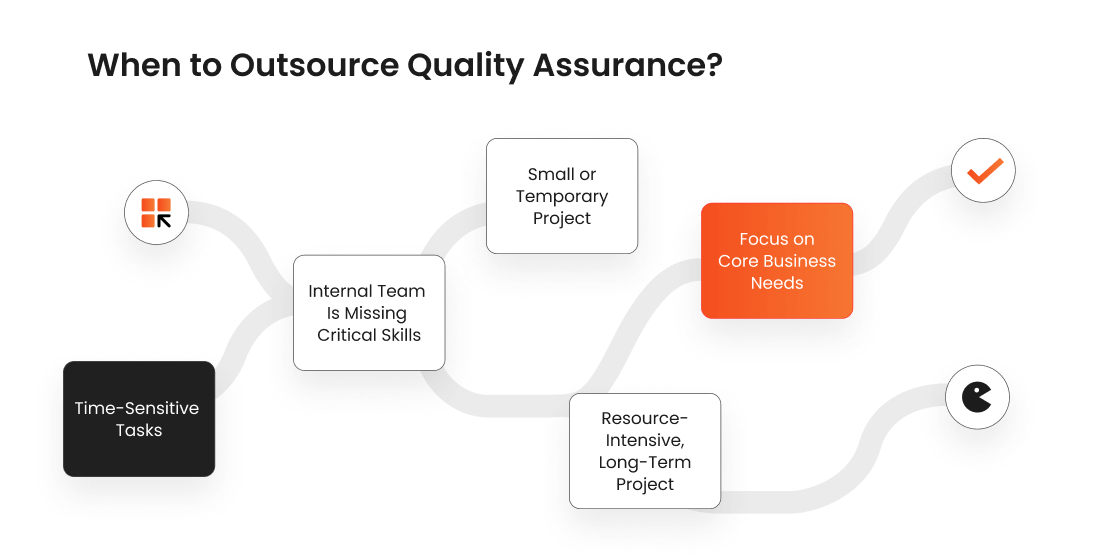
When to Outsource Quality Assurance?
Even though software QA outsourcing is no longer a novelty, not all companies have enough familiarity with this service or know how to use it to meet their goals. As a result, some business owners believe that outsourcing is the universal solution to all software quality-related issues, while others think that outsourcing only makes sense for highly specialized, smaller tasks. So, when does QA outsourcing make the most sense? These are the situations where you should consider outsourcing your QA needs.
Time-sensitive tasks
Sometimes, you just need to have your software tested, and you need it urgently. Deciding on the in-house team composition and then hiring new team members can take well over a month, which is the time you don’t always have. With outsourcing, you can go from the introductory call to the launch of the project in as little as ten days. Your outsourcing partner will advise on the team size and structure, as well as offer you a choice of the most fitting candidates for each team role, allowing you to start testing fast and with better results.
Internal team is missing critical skills
Many quality assurance projects successfully go on for years using only the most basic testing types and tools. However, when the project calls for specific expertise, such as API testing or testing automation, it often turns out that no one on the team possesses the required skills. This is where outsourcing comes into play. It allows companies to fill the knowledge gaps quickly and continue the testing process without any interruptions while taking advantage of cutting-edge industry and technical expertise.
Outsourcing also works perfectly when you need to implement specific tools and technologies into your testing workflow but don’t have the time or resources to have your in-house team master them. For example, automation testing is now becoming more and more reliant on cutting-edge technologies — in particular, artificial intelligence. An outsourced team will not only assemble the perfect tech stack that fits the task best, but will also swiftly introduce the necessary tools into the workflow, helping the team extract maximum value from them without any delays.
Resource-intensive, long-term project
With long-term, all-encompassing testing projects, cost savings are the main reason for outsourcing QA. When you need to employ many QA experts on a full-time, continuous basis, the expenses linked to the project can be difficult to handle for small or medium-sized companies. Outsourcing your QA needs to an external provider, where rates can be twice as low compared to local hiring, makes it more financially feasible to run long-term testing projects without sacrificing the quality of work.
Small or temporary project
When you only need to test a small software product or want to focus on a particular aspect of testing, such as regression testing or security testing, it may not make sense to make any permanent hiring decisions because you may not have a continuous supply of tasks to entrust to new team members in the long run. Instead, outsourcing offers you the flexibility you will definitely come to appreciate, as you can pause, continue, end, or expand your cooperation with the vendor as your project needs change.
Focus on core business needs
When you have a large team that consists of many departments where everyone is responsible for their own chunk of work, there is usually a separate department that takes care of principal business needs and competencies. However, not every business can afford that. As a result, trying to both do the testing on your own and continue working on core business needs, your attention becomes unevenly distributed, and both areas of work begin to suffer. Entrusting testing to a reputable provider allows you to focus on tasks that matter the most or tasks you’re simply better at.
Cut QA costs and speed up releases with expert-level QA outsourcing services
When Not to Outsource Software Quality Assurance
As much as outsourced quality assurance benefits businesses of all calibers, it’s not a universal solution for 100% of software quality-related challenges. Sometimes, outsourcing is simply not viable enough as an alternative to hiring in-house. Here is where you need to think twice before deciding to outsource testing.
Highly specific industry or solution
When developing software for a niche industry, or when dealing with unique types of software — for example, for the Internet of Things or manufacturing solutions — then outsourcing testing is not always possible or advisable. The external team may not have the required expertise to test one-of-a-kind solutions, and having them learn the ropes may take more time than you are willing to spend. Moreover, outsourced teams usually operate offshore, which means they may not be available for in-person testing jobs.
Developing compliant software
An increasing number of software solutions are now required to be compliant with industry regulations. This includes HIPAA compliance for healthcare products, GDPR for a wide range of software, and so on. Compliance testing is reflected in all the latest testing techniques and best practices. However, it’s not always easy to find a testing partner who is actually familiar with different types of compliance and how to test software for them. You can either entrust the job to the internal team or specifically look for a vendor with experience in compliance testing.
Intellectual property or security concerns
In case your testing process involves sensitive data or intellectual property that needs to be protected, working with an outsourced department sometimes makes it harder to manage the security of the project. Since you’ll need to provide different access levels to different groups of team members, retaining full control over the security process can become a hassle. It is still possible to outsource testing of software containing sensitive data, but you need to properly assess the risks, appoint a person who will deal with access levels, and have your vendor sign all applicable NDAs.
Testing as a core competency
When software testing is a core competency of your business and something both the organization and its clients rely upon, it’s best to think twice before outsourcing some or all of the QA needs to an external vendor. In this situation, hiring, training, and growing the in-house team allows you to enjoy more consistent results, plan your resources better, and eventually achieve the quality of testing you aim for, even if it means higher initial investments.
Close collaboration between departments
Many software testing projects heavily rely on smooth communication and continuous collaboration between different teams and departments. The most common case is when the testing and the development teams work together to immediately resolve the discovered bugs and test software again to see if new bugs have appeared. To achieve this level of teamwork, it’s important for both teams to have at least some overlapping hours, similar communication styles, and no language barriers. This is possible to make happen with outsourcing, but it’s going to take more effort compared to when all of your operations are run in-house.
Advantages and Drawbacks of Outsourcing Quality Assurance
As popular as software testing outsourcing is right now, not all companies have had the chance to experience it in person. If you are now considering outsourcing some or all of your testing needs to an external vendor, these are the pros and cons of outsourcing QA to think about.
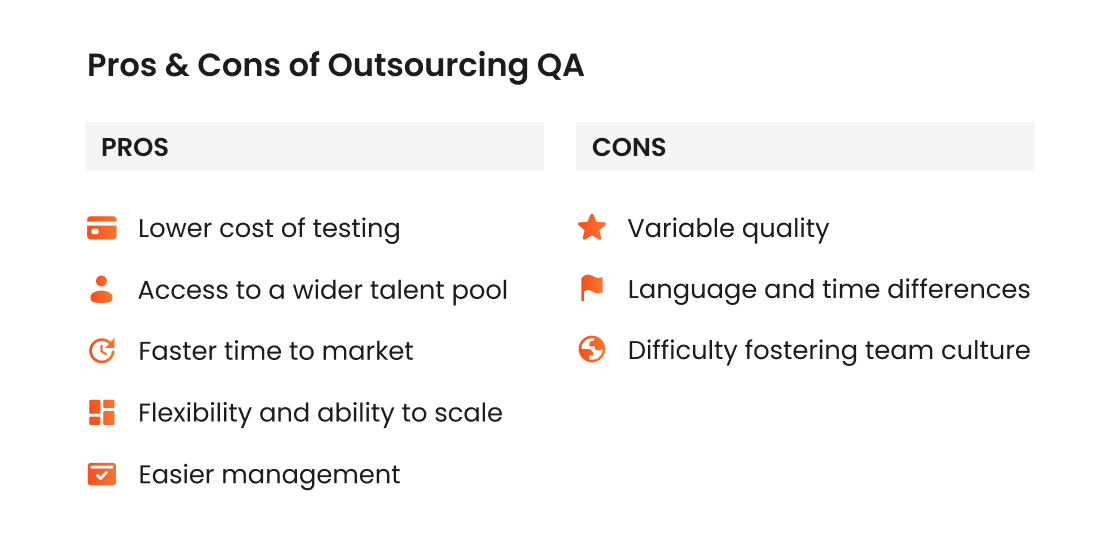
Pros
- Lower cost of testing. This is one of the most frequently mentioned advantages of outsourcing, and it’s easy to see why: with foreign QA teams offering significantly lower rates than in-house specialists, and with no overhead costs, the testing project becomes far less expensive to build and maintain.
- Access to a wider talent pool. With the help of an outsourcing partner, you can quickly assemble a team with the required expertise and remove the knowledge gaps in your existing operations. With in-house hiring, filling the positions can take months, and some niche specialists are downright impossible to hire in-house because they are both rare and in demand.
- Faster time to market. An outsourced team can begin working as early as the developing process starts, giving you real-time updates on the state of the software, allowing you to fix bugs faster, and ultimately achieve a shorter release schedule because you don’t have to wait until testing is completed.
- Flexibility and ability to scale. One of the key benefits of outsourcing is the absolute flexibility you get when assembling the team and managing your testing project. You call the shots about the size and composition of the team, scope and duration of the project, and can pause and unpause the work whenever you like. Moreover, you can easily scale the project by adding new team members or downsize the team if you want to cut your expenses.
- Easier management. If you plan a small to medium testing project, there may not be enough time and resources for effectively managing an in-house team. This can lead to gaps in testing and the project taking longer than anticipated. An outsourcing vendor, on the other hand, can provide management services to make things easier for you.
Reliable team of QA experts, when and where you need them.
Cons
- Variable quality. The quality of testing you’re getting from outsourcing primarily depends on the vendor. When the vendor is missing the required competencies, or when they don’t treat the work with enough diligence, the results can turn out to be disappointing. This is why it’s vital to choose your outsourcing partner carefully.
- Language and time differences. Western companies usually outsource testing to foreign partners, which means they often need to work with team members who are located in a different time zone and know English as their second or third language. The good news is that most outsourcing companies, at least in Europe, employ English-speaking testers and can adjust their working schedule to overlap with yours, at least partially.
- Difficulty fostering team culture. In an ideal scenario, the team of employees involved in the same project is bound not only by the work, but also by the more informal interpersonal connections. And those are difficult to build and maintain when half of the team works remotely. Having informal online meetings helps, but it takes a considerate and mindful team lead to foster a genuine connection between all team members.
Typical Composition of an Outsourced QA Team: QA Engineer and Other Roles
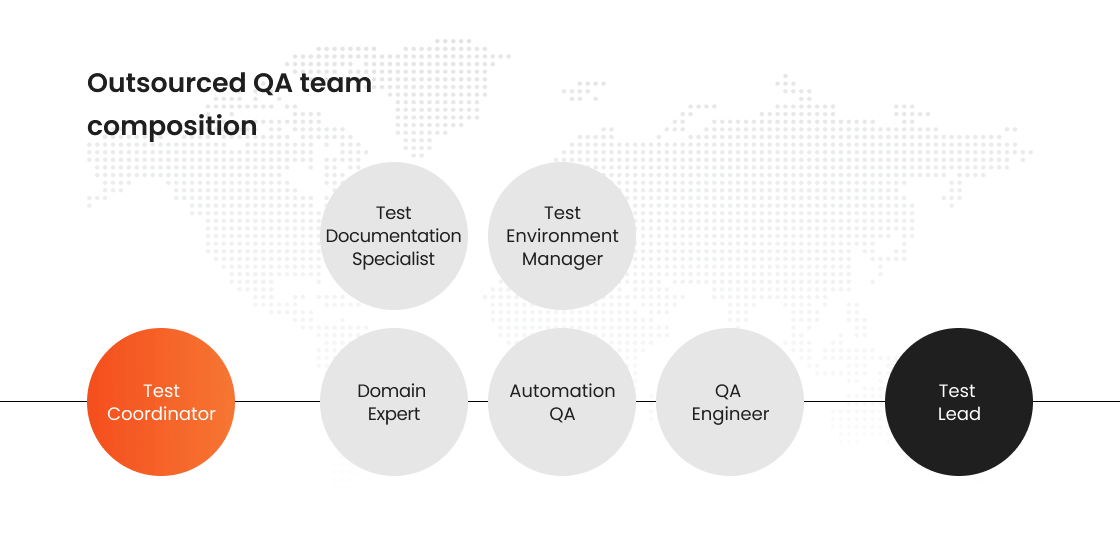
The composition of an outsourced testing team is never fixed and can change depending on the size and complexity of the project, specific requirements, the composition of the in-house team, and so on. Moreover, the composition can change throughout the project — for example, to maximize the testing efforts during a certain development stage or to perform niche types of testing, such as security or penetration testing. Still, some roles have a place on most QA projects. These are the roles you will typically find on an outsourced QA project.
- QA Engineer. This is a principal role on any testing project, as QA Engineers are the ones doing the day-to-day work of checking the software for bugs and verifying its correct performance in different environments.
- Test Lead. A Test Lead, sometimes called a Testing Manager, is a senior member of the QA team whose job is to create the testing plan and strategy, oversee the project, and correct it in case the results don’t align with the project goals.
- Automation QA. Automated testing is now used on more and more QA projects, and an Automation QA will identify areas that can be automated, choose the most appropriate automation tools, and automate the necessary tests.
- Domain Expert. When working with software for a highly specific industry, such as telemedicine or fintech products, having a Domain Expert as a member of the team helps focus on the most important tasks and make sure nothing is missed.
- Test Environment Manager. The environment, which may include software, hardware, network, and other parameters, is essential for proper test management, and a Test Environment Manager takes care of all infrastructure matters.
- Test Documentation Specialist. When working with an external QA department, documentation becomes the backbone of the project that gives you the complete idea of where it is and helps quickly introduce new team members to the process. A Test Documentation Specialist is responsible for creating, maintaining, and transferring all relevant documentation.
- Test Coordinator. This role is usually reserved for large testing projects with many participants, who often work from different locations. A Test Coordinator helps all departments and stakeholders communicate effectively and reach project goals.
Build your ideal QA team and get started in 10 days or less.
How to Pick The Right Software QA Outsourcing Partner for Your Project?
The choice of a company that will provide testing services to your organization is one of the most important choices you can make when outsourcing QA testing. A well-chosen testing firm will allow you to experience all the benefits of outsourcing, while a wrong choice of an outsourcing partner can lead to missed deadlines, a drop in software quality, and disruptions in the STLC. Here are the key factors to help you find the best QA outsourcing partner for your needs.
1. Range of services
Whether you want to entrust your entire testing process to an outside team or you plan to outsource only some aspects of quality assurance, the first thing to do is to make sure that the vendor you’re considering provides the services you require. For example, exploratory testing and functional testing are two services you can get from most vendors, while specialized security testing or hardware testing may be harder to find.
2. Experience and expertise
Before entrusting QA processes to an external team, you need to make sure that these are experienced QA engineers and other specialists who are prepared to tackle all testing challenges. Evaluate the company’s expertise by checking the industries they work with, solutions they test, and manual testing and automation testing tools and techniques they apply in their work. You can look for the company’s case studies and past projects, where its best work is highlighted. You should also inquire whether the vendor has the infrastructure needed for specific parts of QA: for example, physical devices for mobile testing.
3. Testimonials and reputation
You can usually find out a lot about tech companies from their websites and social media, but some things can only be experienced and then shared by former and current customers. This is why it’s important to look for their testimonials, both on the company’s own website and on third-party services. These reviews will tell you not only about the company’s reputation, but also about its most common services and types of projects it handles most often.
4. Skills of team members
Whether you’re building an external testing team from scratch or you’re just adding a few test engineers to your in-house operation, you should look at the skills and competencies of each individual team member. This can include checking their job history, experience with particular industries or product types, specialized skills, certifications, and so on. Such information will help you build a higher-quality team where everyone has the specific expertise you’re looking for.
5. Cost and value for the money
Given that the ability to save money on testing is one of the main reasons why companies invest in QA outsourcing, the aspect of cost is more important than ever. It’s always a good idea to research and compare the rates offered by different outsourcing companies. However, you should also find out what’s included in the price. For example, some companies charge for everything separately, while others set prices that already include various overhead and infrastructure costs. In the latter case, you are getting more value for your money.
6. Flexibility and scalability
One of the biggest benefits of QA outsourcing is the flexibility that comes with it: the best companies don’t force you to accept strict and unfavorable contract terms. Instead, they give you plenty of room when it comes to the size, duration, and direction of the project, with even more room for changing it along the way. For example, at TestFort, we don’t just use a single cooperation model throughout the entire project, but can use different models for different stages, allowing the customer to reap more benefits resource-wise.
7. Cultural compatibility
When your outsourced and internal team work separately from each other and may never share a room throughout the project, the aspect of cultural fit is more crucial than one may think. Primarily, the external team needs to share your company’s mission, goals, and values. You should also make sure that the outsourced department understands and supports your communication style, so that communication issues don’t create tension on the project, leading to underwhelming results.
How Much Does QA Outsourcing Cost? QA Cost Breakdown
Without a doubt, one of the biggest benefits of QA testing outsourcing, the one that compels companies to go for it in the first place, is the cost efficiency of offshore QA outsourcing. However, it’s not always easy to see just how much you can save with QA outsourcing companies until you see how exactly the cost of outsourcing quality assurance testing in the Western world compares to outsourcing your testing needs to an offshore company. Let’s first look at the quick comparison of the cost of hiring a QA in different parts of the world, and then go through a more detailed explanation of the price of partnering with a QA outsourcing company.
| Country | Annual QA engineer salary |
| US | $98,305 |
| UK | $78,000 |
| Australia | $103,602 |
| Germany | $65,984 |
| France | $48,755 |
| The Netherlands | $51,106 |
| Ukraine | $21,000 |
| Poland | $23,486 |
| Hungary | $26,597 |
| India | $8,078 |
| China | $30,973 |
| Mexico | $21,066 |
| Brazil | $27,381 |
| Colombia | $13,000 |
What does the global market for QA outsourcing services look like?
QA outsourcing provides access to skilled engineers across the globe at a fraction of local hiring costs. Many companies outsource their QA to control expenses, speed up delivery, and access specialized expertise. Below is a regional breakdown of how much software testing services typically cost.
United States, United Kingdom, and Australia
The QA testing cost in these regions is the highest, typically ranging from $50 to $150 per hour. Companies outsource here for close collaboration, native English communication, and adherence to strict security or regulatory standards. While expensive, these outsourcing companies are preferred for high-stakes and complex projects.
Western Europe (Germany, Netherlands, France)
Rates range from $40 to $100 per hour. QA outsourcing providers here are known for their mature delivery models and reliability. Software outsourcing testing services in this region are often used for projects requiring deep domain knowledge and multi-language support.
Eastern Europe (Ukraine, Poland, Romania)
A leading destination to outsource quality assurance, with rates typically between $20 and $50 per hour. Many companies rely on Eastern Europe to conduct QA testing efficiently, thanks to strong tech expertise, cultural proximity to Western clients, and a well-developed outsourcing market.
Asia (India, Vietnam, Philippines)
Home to some of the most cost-effective software testing services globally, with QA testing cost starting at $10 per hour. Outsourcing companies in Asia are known for high scalability, fast onboarding, and around-the-clock support. This region remains a popular choice for companies that want to outsource their QA at scale.
Latin America (Mexico, Argentina, Brazil)
Rates fall between $18 and $45 per hour. Nearshore outsourcing to Latin America is growing in popularity due to time zone overlap with North America and competitive pricing. QA outsourcing providers in this region offer a solid mix of affordability and technical competence.
Whether you’re looking to outsource quality assurance for long-term support or a specific testing phase, today’s software outsourcing testing services market offers flexible, cost-effective solutions tailored to your needs.
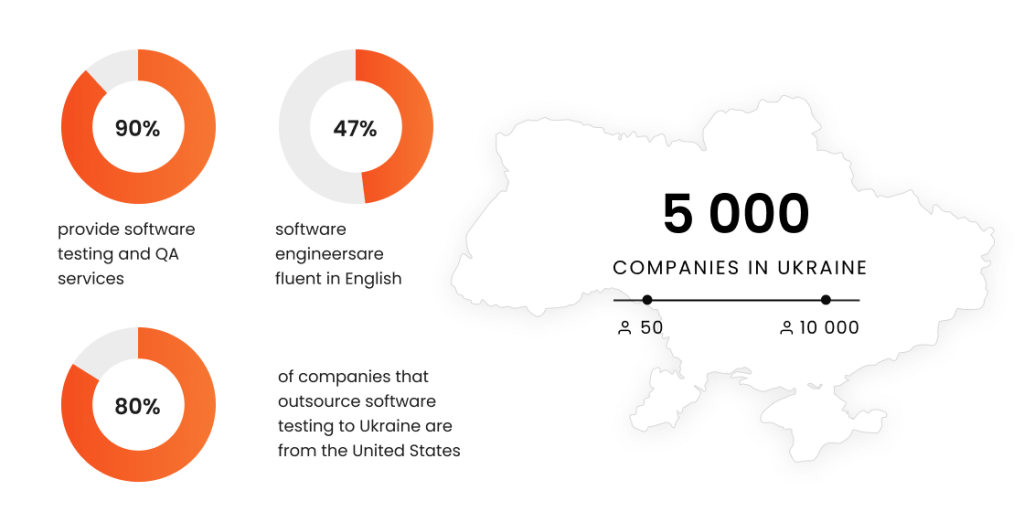
How much does quality assurance outsourcing cost compared to in-house QA?
The reasonable cost of outsourcing quality assurance is probably the reason companies consider most often when deciding to outsource their software testing and quality assurance needs. But how exactly is the cost to hire in-house software testers different from the cost of outsourcing quality assurance to external QA teams? Let’s look at the average expenses of using QA services in-house and through outsourcing.
| Type of expenses | In-house | Outsourcing |
| Hourly rate | $55 | $18 |
| Yearly rate | $114,400 | $37,440 |
| Cost of hiring | $3,500 | $0 |
| Benefits & insurance | $6,000 per year | $0 |
| Taxes & overhead costs | $9,000 per year | $0 |
| Total | $132,900 | $37,440 |
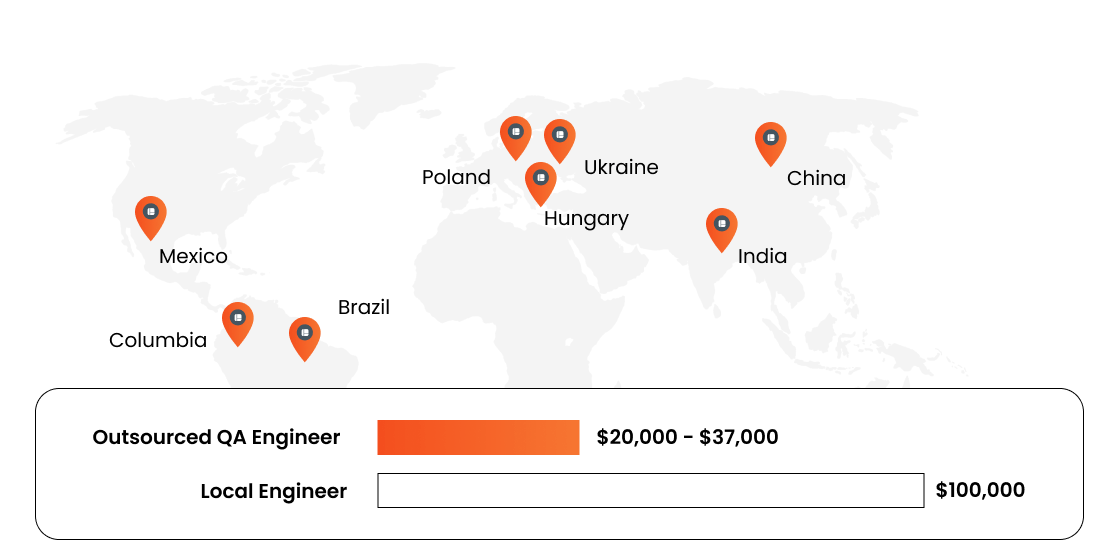
Clearly, while maintaining an in-house QA team does have certain benefits — namely, the absence of a language barrier, the similar work ethic, and the fact that it’s easier to get the in-house team involved in your daily operations compared to a team that works remotely — outsourcing can help shave off a significant portion of your QA budget while still ensuring the unparalleled quality of your products.
Risks of Outsourced QA Testing and How to Mitigate Them
With careful planning and mindful vendor selection, outsourcing quality assurance can be fully expected to deliver the anticipated results. However, like any significant endeavor, quality assurance outsourcing has its own range of risks. These are the biggest risks of software QA outsourcing and how to resolve them.
1. Additional costs
A relatively common issue on outsourcing projects is when the final cost of the project is higher than was originally discussed. This can happen for a myriad of reasons, from the work taking longer than anticipated or the team having to work overtime to reach the project goals to extra infrastructure fees not specified in the contract. You can mitigate this risk by putting all cost-related agreements in writing or using a variation of the fixed price model to plan your spending from the get-go.
2. Communication issues
Successful projects thrive on good communication. Unfortunately, this is not always possible with outsourcing. Some of the most common issues preventing project members from communicating on the desired level are language barrier, time zone differences, and cultural differences. The communication risk can be mitigated by a proper selection of an outsourcing partner — you need to make sure that the team possesses a decent level of English, can adhere to your proposed communication schedule, and is a good fit culturally for the rest of the team.
3. Management problems
Your goals for outsourcing testing can be different, from entrusting the most time-consuming tasks to an external team and giving your internal team time to focus on other important matters to seeking specific expertise with niche solutions and technologies. However, those goals need to be communicated clearly from the start. Otherwise, there is a risk of the outsourcing partner getting free rein regarding the scope of the project and daily tasks. If you want to retain full control over the project, you need to communicate your plans and needs clearly to the outsourcing vendor.
4. Security issues
When entrusting someone to test your software, you will typically need to let the vendor work with sensitive parts of the application and sensitive data as well. In some cases, this leads to various security threats that can be created by the vendor, both knowingly and unknowingly. A way to mitigate this is to first carefully vet the service provider and sign all relevant paperwork, including NDAs, and then plan a robust access system that keeps unauthorized personnel from getting into restricted areas.
5. Vendor dependence
When working with the same vendor for an extended period of time, companies often become overly reliant on their tech partners. In rare cases when the vendor becomes unavailable — for example, during organizational changes or due to the business shifting to another domain — the company may find its QA operations significantly damaged. Moreover, employing the same service provider for years often stalls innovation. However, a well-chosen, responsible vendor will cooperate with you to foster the culture of innovation across the external team and take appropriate measures to mitigate the risks in case they are no longer able to service your company.
6. Misaligned expectations
Outsourcing QA can sometimes lead to gaps between what the client expects and what the vendor delivers. These misalignments may concern testing depth, reporting formats, or quality standards. The risk can be reduced by setting clear KPIs, defining deliverables early, and holding a detailed onboarding session with the QA team.
7. Limited product context
The lack of bias in the way outsourced testers approach projects is one of the reasons why outsourcing is so popular in the first place. However, the fact that external testers don’t always have the same depth of product knowledge as in-house teams can affect the quality and relevance of their testing. This risk can be mitigated by providing comprehensive documentation, walking the team through the product’s key use cases, and involving them in early project discussions.
Not sure where your QA process stands?
Find out with our QA audit services.
How to Make Sure Your Internal Team Is Ready for the Outsourced QA Project
With medium and large companies working with a major software product or several products at once, it’s a common practice to both have an in-house QA department and to outsource parts of the testing process to a trusted QA vendor. This cooperation allows you to experience all the advantages of outsourcing while having an internal team to fall back on if something doesn’t go as planned.
However, your in-house team may be unprepared to work with a software QA outsourcing team. Here is how to make sure your internal team is fully ready for the upcoming cooperation:
- Assign proper roles. Ideally, the internal and external team of testers need to work like a well-oiled machine throughout the entire collaboration process, and that is only possible when everyone knows their role, their scope of tasks, and who to contact in case various questions or issues arise.
- Put the right person in charge. Managing just one internal team for a prolonged period of time is a challenge on its own, and adding an outsourced team to the mix requires a senior-level manager to handle everything from the big picture and project goals to the daily tasks and performance evaluation.
- Adjust your workflows. By the time the outsourced team begins working on the project, they must already have everything they need to deliver the best quality of work without any delays. This includes shared project infrastructure, access to the company’s software, tools and bug reporting solutions used on the project, and more.
- Set up an informal introductory session. Good communication is a key element of successful long-term projects, but fostering open communication can be difficult when the teams work from different locations and, often, during different time zones. This is why it’s important that everyone gets to know the rest of the team before the start of the project. It’s also a good idea to make those informal sessions regular, so that communication strengthens and evolves with every testing phase.
How to Increase the Efficiency of Outsourced QA: Tips and Best Practices
Without a doubt, the practice of QA outsourcing helps create high-quality software with fewer resources used. However, not all outsourced software QA projects work flawlessly from the get-go. In addition to preparing your in-house team for the upcoming collaboration, here is what else you can do to benefit from this experience the most:
- Put everything in writing. In quality testing outsourcing, there is no place for verbal agreements, and everything should be put into the contract or discussed and unambiguously recorded otherwise.
- Conduct one-on-one interviews. As the project manager, QA team lead, or another person in charge of the whole operation, you should consider getting to know your future team members as one of your first priorities.
- Set a communication schedule. Even if you plan on your outsourcing team to work mostly independently from the internal team, it’s still vital to regularly sync up and evaluate what has been done already and what needs to be done further down the road. You should not only choose a schedule but also select the communication channels and account for the time difference.
- Design an evaluation plan. This is particularly useful for long-term projects where the outsourcing team is involved in extensive testing over an extended period of time. During this time, it’s important to see how the team’s work aligns with your project goals and whether every team member lives up to their potential.
- Create plans for everything that may happen. For example, both teams need to have a clear action plan when the project undergoes major changes, when the deadline is moved, when the composition of the team changes, etc.
- Establish clear communication channels. Decide early on which tools you’ll use for daily updates, bug tracking, and documentation to avoid miscommunication or delays.
- Define measurable QA goals. Whether it’s reducing production bugs or improving test coverage, setting specific goals helps both sides stay aligned and evaluate progress effectively.
- Schedule regular retrospectives. Even with remote teams, reviewing collaboration outcomes together helps identify blockers, fine-tune workflows, and continuously improve QA outcomes.
Proven Results: How QA Outsourcing Delivers Real Value
Outsourcing quality assurance isn’t just a theoretical advantage — it’s a practical, results-driven strategy used by companies around the world to improve software quality, reduce costs, and speed up delivery. Below are two examples that illustrate how outsourced QA support can lead to measurable business outcomes.
Case study 1: Streamlining clinical research with 700+ hours saved through QA automation
A US-based healthcare tech company developing a document management platform for clinical research sites needed end-to-end QA support to improve quality and speed up releases. Initially burdened by manual testing, tight deadlines, and a lack of infrastructure, the client brought us in to build a scalable QA process that could keep pace with development across web and mobile.
We started with manual testing but quickly prioritized automation. Our team built a 450+ test suite integrated into CI/CD pipelines using Cypress and Azure DevOps, reducing regression testing time by over 700 hours. API testing enabled efficient test data creation and backend verification, while AI tools supported test maintenance and adaptation in fast-changing areas. As a result, the client saw a 40% drop in critical bugs, a 20% reduction in QA costs, and full compliance coverage thanks to certified QA engineers embedded in the process.
Get all the details from the full case study
Case study 2: Fast-tracking a high-impact media app launch with 100% test coverage and zero post-release bugs
15 Seconds of Fame — a US-based media platform allowing fans to get jumbotron videos of themselves from live events — needed rapid, comprehensive QA across three connected applications: a hybrid mobile app, a web admin panel, and an in-venue broadcast app. With no test coverage in place and a go-live date looming, our team was brought in to build a strategy and validate performance in real-world scenarios.
Over 5 months, we created the entire QA process from scratch, simulating large media uploads, live user loads, and varying network conditions using TestRTC and Dotcom-Monitor. Our testing ensured seamless data flow across all platforms, 99.9% success in file sharing, and 4x more device compatibility through real-device testing and Sauce Labs support. Most importantly, the product launched without a single critical bug reported, allowing the client to scale user adoption quickly and confidently.
Learn more from the full case study
Final Thoughts
Outsourced software QA has become an essential part of modern software development and testing strategies. It allows companies to get quick access to specialized expertise, streamline delivery, and flexibly scale QA efforts without the overhead of building in-house teams. Whether you’re developing a new product, expanding into new markets, or optimizing existing workflows, outsourcing helps ensure your software meets the highest quality standards.
By choosing the right QA partner, you gain more than just extra hands — you gain a fresh perspective, proven processes, and access to the latest testing tools and methodologies. With the right collaboration model in place, outsourced QA can bring lasting value to your development lifecycle and help your team deliver better software, faster.
Frequently Asked Questions
 What are the benefits of QA outsourcing?
What are the benefits of QA outsourcing?
QA outsourcing gives you access to experienced testers, scalable resources, and faster delivery without increasing headcount. It helps reduce costs, improve test coverage, and speed up time-to-market, especially for companies that lack in-house QA expertise or want to focus internal resources on core development.
 Which services does outsourcing software testing usually include?
Which services does outsourcing software testing usually include?
Outsourced QA teams typically provide functional testing, test automation, performance and load testing, usability testing, security testing, and compatibility testing. Some also offer QA consulting, tool integration, and test documentation. Services can be tailored to project needs, from one-off testing to fully managed QA support.
 How much does offshore QA outsourcing cost?
How much does offshore QA outsourcing cost?
Offshore QA rates range from $20 to $50 per hour, depending on the region, expertise level, and service complexity. Eastern Europe, India, and Latin America offer competitive pricing without compromising quality. Project-based pricing, dedicated teams, or time-and-materials models are also commonly used.
 What’s the minimum project size with quality assurance outsourcing?
What’s the minimum project size with quality assurance outsourcing?
There’s no fixed minimum, but most QA vendors accept short-term engagements starting at 4-6 weeks or with budgets around $5,000-$10,000. Even smaller projects, like MVP testing or release verification, can benefit from outsourcing if you need fast results or lack internal testers.
 How to ensure our data stays safe when working with an outsourcing partner?
How to ensure our data stays safe when working with an outsourcing partner?
Choose a vendor with strict security protocols, such as NDA agreements, role-based access control, and secure infrastructure. Ask about their compliance with ISO 27001 or other standards like CMMI. You can also restrict access to production data and provide sanitized test environments to minimize risk.
Jump to section
Hand over your project to the pros.
Let’s talk about how we can give your project the push it needs to succeed!






